
(Source) “Life is a marathon, but minority runners often start the race from further back than do whites.” Do you agree or disagree with this quote? How about in the context of higher education? It is no secret that increasing diversity in higher education is a goal for many educational institutions. Affirmative action is

JLPP’s Alex Poe takes us through his top five law and public policy topics to keep an eye on in 2013.

Lyndsey Marcelino responds to Margaret Schmidt’s post that analyzed the affirmative action admission policies in Fisher v. University of Texas at Austin.

Margaret Schmidt reflects on the importance of Fisher v. University of Texas as a vessel for modifying the country’s flawed affirmative action programs.
